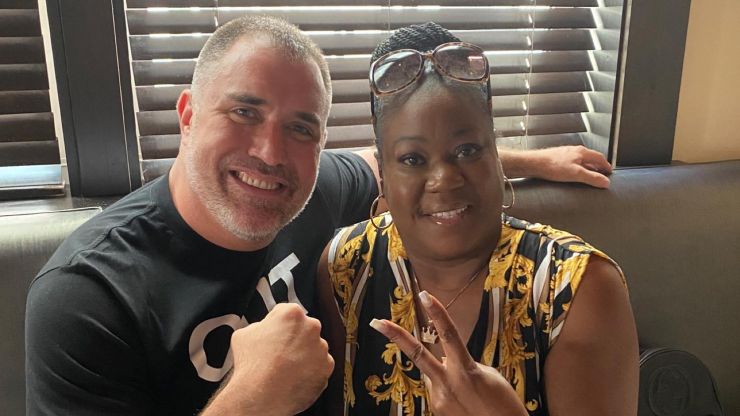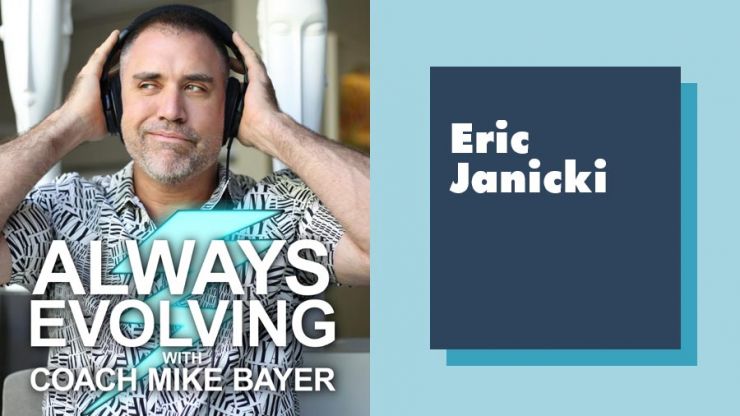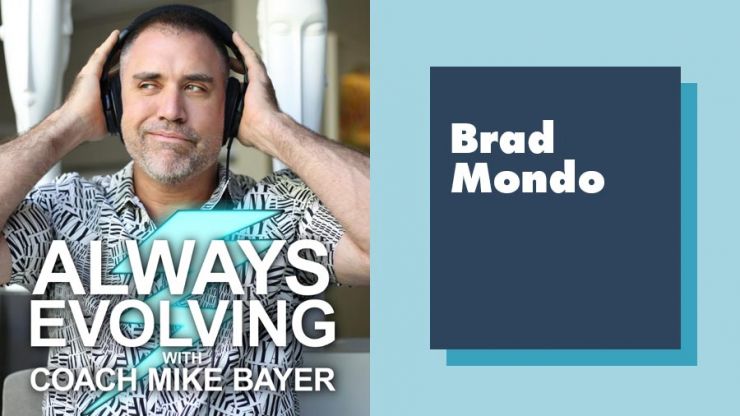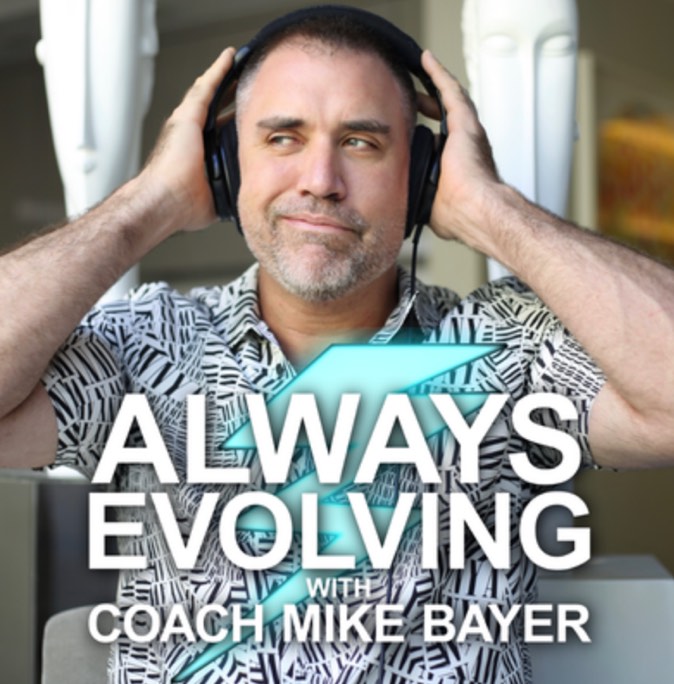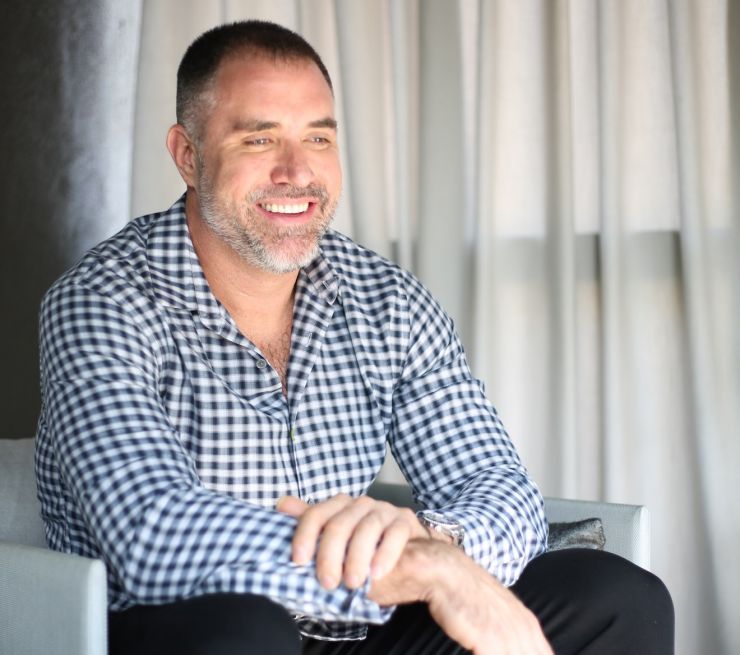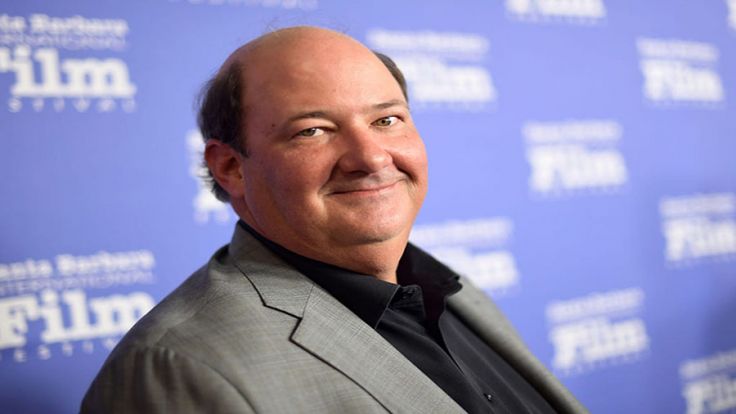
“The Office” Star Brian Baumgartner Shares Behind The Scenes Adventures From America’s Most Beloved TV Show!
08/25/20
PROGRAM: ALWAYS EVOLVING WITH COACH MIKE
SHOW: CM1038
GUEST: BRIAN BAUMGARTNER
(START PODCAST)
COACH MIKE BAYER: Welcome back to this week’s episode of “Always Evolving” with me Coach Mike. I’m so excited to introduce my next guest Brian Baumgartner. Brian played Kevin Malone on the iconic TV show “The Office” for eight seasons. He was on all 188 episodes, which that’s crazy. Brian brought the cast back together as he hosted a very limited podcast on “Spotify” called “The World History of the Office” where you will hear all the behind the scenes trivia, it’s really fascinating and he’s here to even talk some more with us, so thank you.
BRIAN BAUMGARTNER: Thank you, thanks for having me.
MIKE: Can I, can I ask you a few questions just to kick this off?
BRIAN: Sure, yeah you can ask me whatever you want.
MIKE: Otherwise, otherwise this whole thing would be muted um, so…you ended up landing the iconic show “The Office” which is kind of like the “Friends” so to speak, but…you know a different take and a different style. It’s a mega success, but prior to that what were you doing?
BRIAN: Theater, yeah. I mean I uh, I graduated from college and went to SMU in Dallas. They had a conservatory training program for theater and I then I was, I was a theater actor. I was doing a reginal theater around the country um, New York, Chicago, Minneapolis, San Francisco, uh and was doing that and then um, I—small theaters, big theaters, yeah. Um, and touring theaters and uh, and then I moved to Los Angeles, I knew I wanted to move to Los Angeles and uh, so I always said I would pay my dues on the road once I moved to Los Angeles. I actually met the uh, the producers on “The Office”.
MIKE: Mm.
BRIAN: About three months after I came to town so once I was in L.A. my relationship with them and the show started quickly but I was doing theater around the country before that.
MIKE: And just you don’t need to disclose exactly how much you were making but when someone is doing theater typically what are they making?
BRIAN: Well it’s actually funny, I, I will tell you this story I was uh, I was—for a time, I was the artistic director with theater. I would go to New York to see new shows and try to decide what we should be doing at this theater that I was at and uh, I was like every time I went to New York I would see this woman Alison Janney. Now Alison Janney, is one of the greatest actors you’ve seen her in every movie you know, C.J. Cregg on the “West Wing” so this is just prior to her being on the “West Wing”, but every time I would go to New York, I was seeing her on Broadway like big off Broadway shows and I knew the playwright so I got invited backstage, now I’m a nobody. I’m a theater actor mostly from out of town. I’m backstage in um, back in the greenroom and I’m kind of just watching what’s going on and the show was almost uh, completed and I hear Alison talking to someone, she’s like “Well, there’s this play that I really wanna do but you know but if I take that play that six weeks I’m not gonna have anything to do and you know I gotta, I gotta pay rent,” and at that it was truly a life changing moment. I saw her about a year ago and told her this story. For me I was like, “Oh my God if Alison, if this woman who I’m seeing on every big stage in New York, at the top, at the top level of actors in New York, if she’s worried about making rent and not working for six weeks, what am I doing?” and so yeah a big part of it was that experience with Alison and also you know if you don’t know, I love theater. Theater is really hard. Like there’s hard, it’s not digging ditches, but it’s eight shows a week, you’re working you know two shows somedays the only day you have off is Monday—nothing goes on a Monday. Nobody cares. It’s jus a very hard, it’s a hard uh business and so that was really impetus, my experiencing seeing her was like you need to explore film and television.
MIKE: Got it, so basically you love theater and if you could of made a fortune doing theater maybe you would of stayed in theater?
BRIAN: Well I will say that you know there is nothing like the experience the real intimate experience of doing a show in front of a live audience that you are—you’re an experiencing whatever is happening live and in the moment. That is a really powerful thing, however you know what’s the largest theater I ever performed in? It’s a rhetorical question, I don’t know five thousand people, you know maybe? A few times uh, a couple thousand and when you start thinking like, oh I can do this thing and fifteen million people are watching it at the same time, you know back—especially when you, when television was, was you know on at nine o’clock on Thursday, everybody was watching at nine o’clock and there was no other option, um the power of that, being able to entertain or make people think or whatever on that scale um, it’s also pretty cool.
MIKE: And it’s pretty amazing you move to L.A. and you somehow got presented with this opportunity and were there other opportunities before that in L.A. or was that kind of like the first opportunity?
BRIAN: I had moved just you know, just a few months before I had done a couple of small commercials. I had appeared in um, an episode of a very small part of an episode of “C.S.I.”. There were like a couple of little things that I had done um, but I was um, the one thing I tell actors or people who say that they want to be an actor that you know they’re like what should I do? My best piece of advice is watch television and watch films like see what’s out there because if you get an audition for a show and you don’t know, is it, is it—I mean, I don’t think so, is it funny or is it not funny, like what and (STAMMER) but not just that but the style, size, the style of acting, the style of the show like all of those things I think are really, really important to understand also what’s trending like where is television moving, like which direction and so I have seen the British version of “The Office” and was a huge fan of it and when they announced that “NBC” was doing this I was aware of the show and I thought, “Well if I’m gonna get on the show right now, this is the show that I should be in, because they’re looking for unknown people, they’re looking for people who would you know would be working at a paper company in Scranton, Pennsylvania and the specific style I felt that I got and so yeah, that’s my, that’s my biggest piece of advice.
MIKE: And did you—were you ever scratching your head saying like why am I not being casted for the heart throb or did you?
BRIAN: No, no. That was never a part of my thing.
MIKE: So when you audition did you see all the other potential options that were auditioning as well?
BRIAN: Actually one of the coolest things that I have in my office um, I, I…I was not aware at the time but I also probably wouldn’t have known them at the time um, but when Steve Carrell left the show Alison Jones who was the casting director went into her files and she was trying to find something cool to give to Steve like something from the first audition or you know some, some memento, so she came up to me at like his party. His going away party and she was like, “You know, I didn’t really find anything for Steve but I found this and I wanted to give it to you,” it’s just a piece of printer paper and it said Kevin Malone and then it had one, two, three, three names and it was uh, myself and it was Eric Stonestreet who ended up doing just fine winning multiples Emmy’s for um, modern family and Jorge Garcia who went—was you know “Lost” he was on “Lost” and whatever that show, he’s on. But anyway, it was, it was a cool thing because we all just ultimately ended up you know having some success but ended up on the show that we should have been on.
MIKE: And it—did your family or anyone in your life go like, what are you doing going to Hollywood and L.A.” or was everyone just like, “no you got it, you go”?
BRIAN: Um, I had tremendous support from my family. Um, truly early on I—what was revealed to me later actually which was the early days uh, after—shortly after college when I started doing theater that my parents came to Minneapolis, Minnesota to see me in a play and there were, I don’t know, 14 people in the audience or you know something and their drive back to their hotel was filled with ‘what the hell was he doing?’, like this is, ‘what is he doing’, ‘why is he doing this’ um, they never shared it with me they always very supportive but in private back then they were like why is he chosen this career path?
MIKE: So they drove back, they drove back and were like, why is he doing this?
BRIAN: Yeah like, like they share this with me years later as a joke but yeah I think that they saw me doing a show with 14 people in the audience including them, right? And they were like ‘great job, honey’ and they got in the car to drive and they were like, ‘what does he do?’ Like ‘this is a disaster, why has he made this choice to do this thing?’ They never shared that with me, but um, but yes years later they were like, well this is what we thought at the time. Good job you preserve through.
MIKE: Did you have this vision like did work when you were younger or when you were in theater were you like I’m gonna be on a huge show and I’m—you know some people say you attract what you put out, right?
BRIAN: Right.
MIKE: Did you—
BRIAN: Um go ahead.
MIKE: Um did you dr—did you have a vision of I wanna be in front of this, this, and this and?
BRIAN: No it honestly for me and I think it’s what made “The Office” very special I think it was, it was littered with people that this was true about. I think that I wanted to make a living and I wanted to do good work and I think that’s the thing about this show that is tremendously gratifying and Steve Carell talks to me in the podcast about this that we just wanted to make a living and the fact that we were able to do it on a show that we actually liked—there is a lot of successful shows and I—you know, I’m not gonna name names but there are a lot of actors that are on really successful shows that are like, huh the paycheck is really good and it wasn’t about that for us. It was really constantly trying to make this show better being proud of the show of what we were doing and um, and we were aware that what we were doing was changing television and was probably going to fail because of that um, but it was no—it was about that and I think that yeah, for me early on the aspirational thing would have been like, truly like, well I’m going to be Alison Janney like I won’t be the person on the stage that every time someone goes to New York they’re seeing me in this new play and you know, that shifted for me and um, and I feel very lucky and fortunate you know a lot of times there are lot of uh, extremely talented people that timing is off timing is wrong, life hap—you know, uh so I feel very lucky in that regard that um, you know things just worked out the way they did.
MIKE: Yeah, I, I think it’s so great that it worked out for you too because it’s, it’s an unexpected success. It’s a bigger success than you even imagine clearly, you’re skill in the art of acting you were honing and practicing. It wasn’t just you moved to L.A. and were—I’m gonna do “Instagram” and become an actor, right? So…
BRIAN: Right.
MIKE: …you know you put in the work, you put in the time, you are passionate, it’s an art and, and you have massive success and I, I wanna get to the podcast one more question I have for you because it’s—I’m interested in as you have more success with the show and as your fame rose, what was the biggest challenge for you overall mentally as things started taking off was there anything that started to get like dragged with you or challenging like, was it hard for you to deal with the Hollywood nature of it all or were you—I know I’m throwing in a lot of questions but I’m just trying to—
BRIAN: Right, um…you know, no one’s ever asked me in…in quite that way before and so I’ll just answer like what I’m thinking about. I think that in some ways that I’m, I’m probably not as old as you think I am but I think that there for me—
MIKE: How old are you?
BRIAN: There is um, for me you believe God, I don’t think the “Zoom” works. I think um, I think that there’s a part of me that…for me it really, it was never about being famous that was not a part of it for me, but if you look at like I don’t know this is so nerdy and stupid, but like Al Pacino or um, um…Robert De Niro. You know…it wasn’t about their personal life.
MIKE: Mm hm.
BRIAN: It wasn’t about their, it wasn’t about their persona or what they were doing on a Saturday night. It was about the characters that they created.
MIKE: And the art at—
BRIAN: Sorry?
MIKE: And it’s, and it’s about the art. The art…
BRIAN: Yeah.
MIKE: …of the artistry, right?
BRIAN: Yes. For me and that’s what it was about, it was about, it was about creating characters um, and, and so to me there’s a great mystery in—there, there should be some mystery about who the person is. If what, if what’s important is actually the characters that they create and what that brings across and I think that now so often because we know so much about everybody, it’s way more difficult to have people suspend their disbelief and go places. I mean truly, maybe now, like currently, you got Tom Hanks and that’s about it. You can let Tom Hanks create a bold different character and go with it and but more often than not you, you cannot and so what you’re sexuality is, determines the kinds of roles you can and cannot play? And you know, obviously you know what, what you look like—I mean what you look like doesn’t change but how you are perceived in the world as a person now is tied so strongly into you know what characters you are able to play and so you know for me, that that is a difficult thing. That and you know sitting down at a restaurant and being in the middle of eating and, and somebody coming up in that moment. I mean truly people coming up to me doesn’t bother me it’s just that it’s all about timing and approach. Like that for me, that’s it’s all about timing and approach.
MIKE: Yeah, so it, so it sounds like the big surprise to you was how much of your personal life people tried to find out or get into and then that also mirrors potentically the type of roles you can play and the type of characters you’re allowed to play based upon your—like I know some actors don’t have social media.
BRIAN: Right.
MIKE: Um, a woman from “Saturday Night Live” I don’t think I’ve ever—I forgot her name. I don’t think Sigourney Weaver uses hers, there’s a few of them and I actually …
BRIAN: Right.
MIKE: …love it, ‘cause their social media is so funny to me because it’s someone else doing it and it just looks like…
BRIAN: Right.
MIKE: You know it’s like a fan.
BRIAN: I think that, I think that for me um, I think that the only reason why I use it is to attempt to at least—because the problem is, is—to me that’s a cop out because if you don’t use—I mean I’m not saying you have to please, but I use it very sparingly but for me really it’s about, it’s about controlling the narrative because the narrative is going to get out there anyway you know? Like I enjoy going to the “Lakers” game, I love going to “Dodgers” games. I mean, obviously in a different time or whatever so it’s like I’m not talking about being hold up in my house but you know…Jack Nicholson been to every “Lakers” game since 1967 or whatever you know? I mean like it’s just, it’s a, it’s a about a—for me it’s about where it becomes about the fame, where it becomes about elevating yourself, to me it, it just it has to detract from the work that you’re trying to do…
MIKE: Yeah you know…
BRIAN: …that’s for me.
MIKE: Yeah, yeah, it’s interesting like when I think back as a kid which very I never—you know I never quite understood fandoms and obsessions with people that you don’t know like I understand art and loving the art and being like, “oh my gosh let me embrace it, I’m inspire, but like being that curious about somebody’s personal life who I don’t know and I want—and it’s just the whole, the whole thing is very strange to me, but I also think, God social—the camera phone has killed so many things in life because even if you’re eating at a restaurant someone’s taking a picture of you eating a pretzel with mustard and you’re just like what are you doing?
BRIAN: Right.
MIKE: Or like when people come up to you and have a conversation with you but like it its sounds like that’s the nature of what it is and, and but its—do you feel like it’s your roles get affected based upon how people think of your per—like I don’t know about your personal life do you think that affects you?
BRIAN: Uh, no I think it’s more the sustain and credible popularity of “The Office” now, I think that more than anything um, has the potential to effect—I mean I’ve been lucky enough to be able to do some different things particularly lately, but there’s a lot of people who just, who just want to see me as Kevin.
MIKE: Got it, and so since “The Office” you now have the podcast, you…the show, the show has massive success the podcast is gonna be a huge success so what, what will people get from listening to…
BRIAN: I think—
MIKE: …”The World History of The Office”?
BRIAN: For me it wasn’t about um, for me it was really an exploration which was—because it mind blowing to me which was why is the show now, seven years since we filmed the last scene that we shot. Why is it now the most watched show on television? Which by basically by any metric it is, so and why is—and why are people who are 12 and 13 years old, like why are they so into it like why—what happened. We thought we were making a show for you know, people who have worked in an office that hopefully they would think it was funny and hopefully they would get it was funny and see part of their daily life you know, mocked or whatever in the show. But that’s what we thought we were making the show for, but like why has it had this popularity and so for me it was really an active exploration of trying to answer that question like what has happened so for me, that. Trying to figure that out is, is fascinating and like Billie Eilish who you know, is like the biggest popstar on the planet, she’s watched 14 times, 16 times. You know like, why is—like what is—you know, she’s a teenager like why is this happened. Um, and so that exploration was really fun and the idea, the ability to tell the story that so many people don’t know especially the young people which don’t know one that “NBC” even exist, right?
MIKE: Yeah.
BRIAN: And two it’s always on “Netflix”, this was a “Netflix” show “The Office” that we can watch uh, you know over 200 episodes or 200 half hours um, I—so that was, that was important to me that, that really we were dead after six episodes. I mean this show was not going any further and then after 12 episodes we took our name plates off the door, we took everything out—I mean we home and we were never coming back and the courage, the artistry of a few people, the courage of one person really in “NBC” that, that gave the show a chance and let it grow and find its audience. I mean to go from that to where it is today, I think it’s just a great story.
MIKE: And why, why do you think if you were to, why do you think the show resonates with people so much?
BRIAN: Um, I think that there, I think that it brings comfort, I think that people do, people say um, bad things or cringy thing but at the heart of it, this group of people who work in an office together ultimately care a lot for each other. There is a tremendous heart um within the relationships and I think that um, “The Office” more than we realize mirrors the experience of kids at school with an unreasonable teacher that’s making you do things that you don’t wanna do, sitting next to people you didn’t choose to sit next to going to class with people you didn’t necessarily choose but you know through elementary school, through junior high, through high—and you’re still with these same people every day, every year, uh that progression that takes place I think that that mirror was—it just seems obvious when I say it or when someone said it to me but it was not anything that we were aware of so um, I think that’s, I think that’s a big reason and I, I think that the whole heart. And I think potentially not at all to get political, but you know the idea of 15 years ago there’s a small business that you can have healthcare in, that you know where you’re showing up every single day it’s a fairly intimate setting versus you know what really becomes big bucks store now with very little you know it’s all about more so than on our show it’s about checking corporate guidelines and working at big buck stores, someone who I spoke to on the podcast said, it’s crazy but there is maybe a hint of nostalgia for the good old days from working at a paper company (UNINTELLIGIBLE) and that was clearly never a part of what we were creating when it was happening.
MIKE: Yeah and I think it also uh, and the extreme other angle is you it you were allowed—if you look at “The Office” and the conversations you have there and how inappropriate things are from time to time there’s a lot of forgiveness and there’s a lot of like mistakes…
BRIAN: Yes.
MIKE: …a lot like I’m in California, the laws are so intense that it can strip away the soul of even of having that intimacy and friendship and relatability and connection.
BRIAN: Yeah.
MIKE: Um, where it’s all about don’t say this, say this, do this, don’t do this and I just think um, it’s almost like you want to be in that office.
BRIAN: That’s, that’s exactly what, what I had people say.
MIKE: Yeah?
BRIAN: Yeah. Do you wish that you could work there? Which again, when we were doing the show, that was not a, that was not a, it was not about—hey let’s show you a great fun place to work, it was a dying industry, paper you know, technology is starting like all, all of those things that are happening yet now for people to go back and be like yeah, gosh I wish that I worked there. I wanna work someplace like there um, and just knowing in terms of like small business. Those kinds of places don’t exist as much even today.
MIKE: Mm. and Brian what, what is—I know you have the podcast and in terms of what is inspiring or exciting to you, and what you really bodies of work that you’re getting into, you probably have a ton of options, so…
BRIAN: Um, yeah I mean, I um, I shot three movies in the last 18 months, I got one um, that I understand that was done today, I’m really excited about it, I can see it next week.
MIKE: Cool.
BRIAN: And addition one of the most fun things that I’ve been working on for the last couple of years is um, I’ve been doing some animated voice over stuff and I have a new series that will be out on “Netflix”. And we’ll see the—what’s going on now but hopefully, towards the beginning of 2021 we’ll have 30 episodes that are in the can already so that has been really fun for me. To creating a character with just by voicing it a different way.
MIKE: That’s awesome man, well thank you for coming on, on “Always Evolving” everyone go check out his podcast which is called, “The World History of The Office”. So you wanna check that out. Bran, I really appreciate you taking the time.
BRIAN: Absolutely.
MIKE: Listen man, you’re an inspiring guy I love your story, um, you’re relatable, and just your humility and your passion, and your creation of art is super inspiring so thanks for joining us.
BRIAN: Thanks so much I’m really appreciate it.
MIKE: Thank you Brian for coming on “Always Evolving” and talking to us about your life, your inspirations uh, being a part of one of America’s favorite cult-classic TV shows. I can’t wait to check out, “The World History of the Office” exclusively on “Spotify”. And I’d love for you to check out our free empowerment group uh, this last week we had over 250 people live and we talked about releasing your negativity and getting positive, Malory Ervin, who you heard on one of the podcast episode. She’s gonna be facilitating an exercise on living life to your fullest. All you need to do is enter your email which is totally free, “COACHMIKEBAYER.COM” and enter your email once every week you’ll get an update of the different people who are speaking for that week. And don’t forget to always subscribe here at “Always Evolving” and please give it a rating, a thumbs up, and let me know what you think, until next time stay safe. Thank you.
(END SHOW)
Other Episodes
